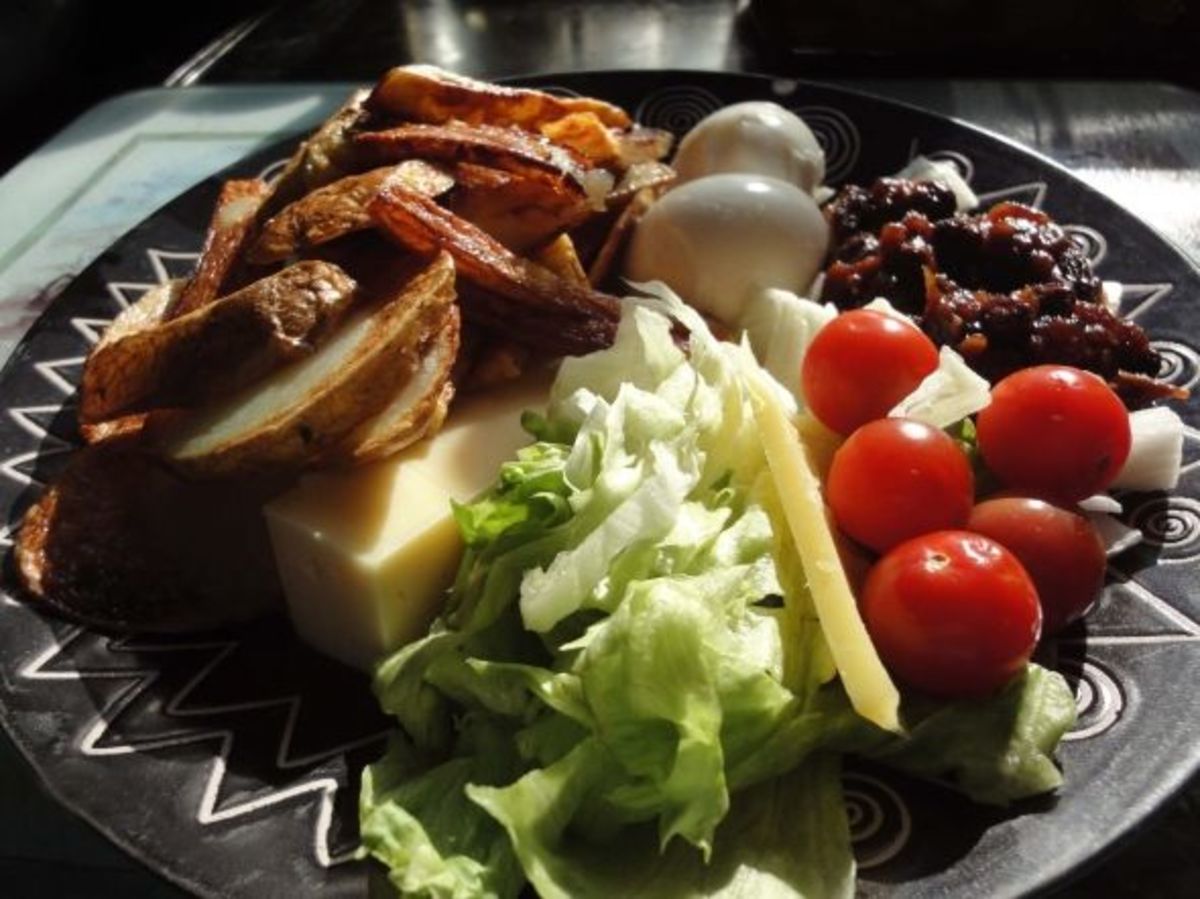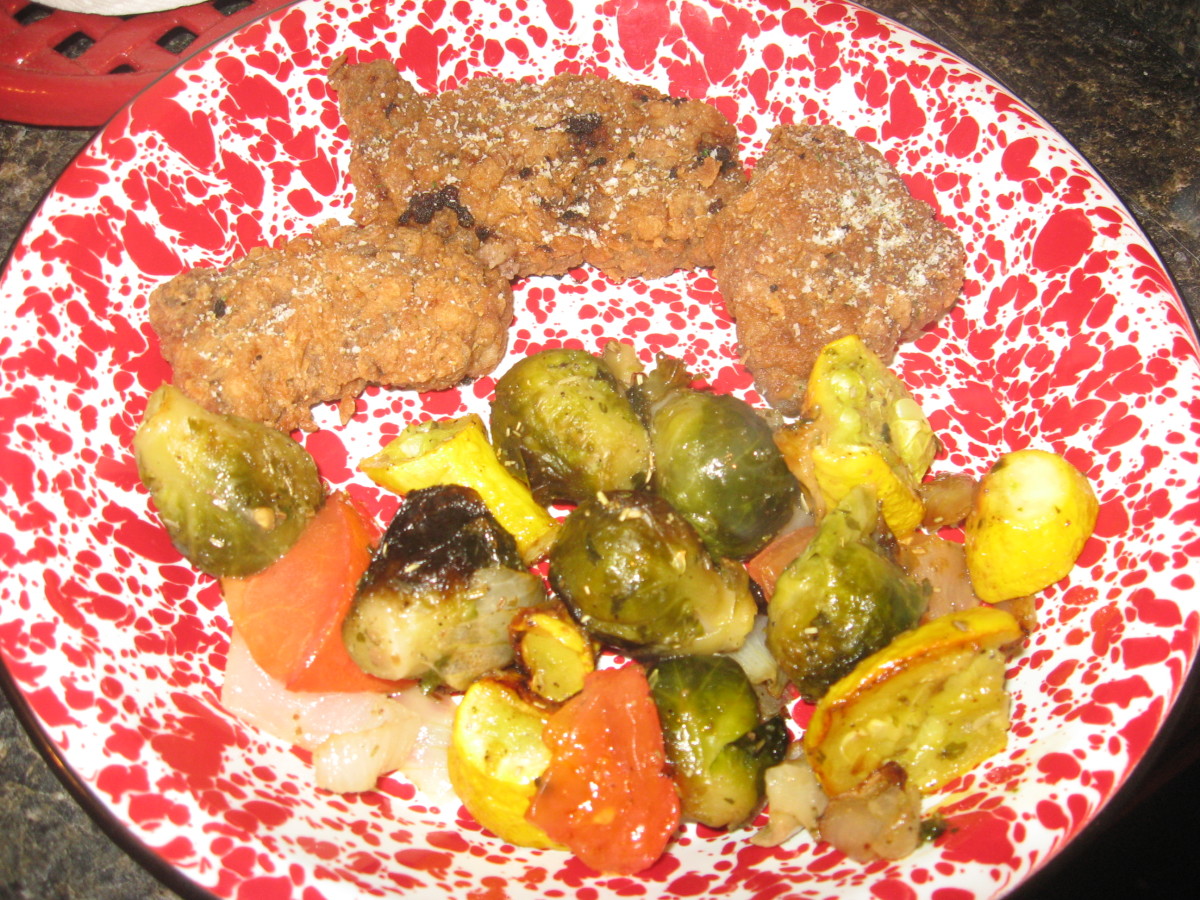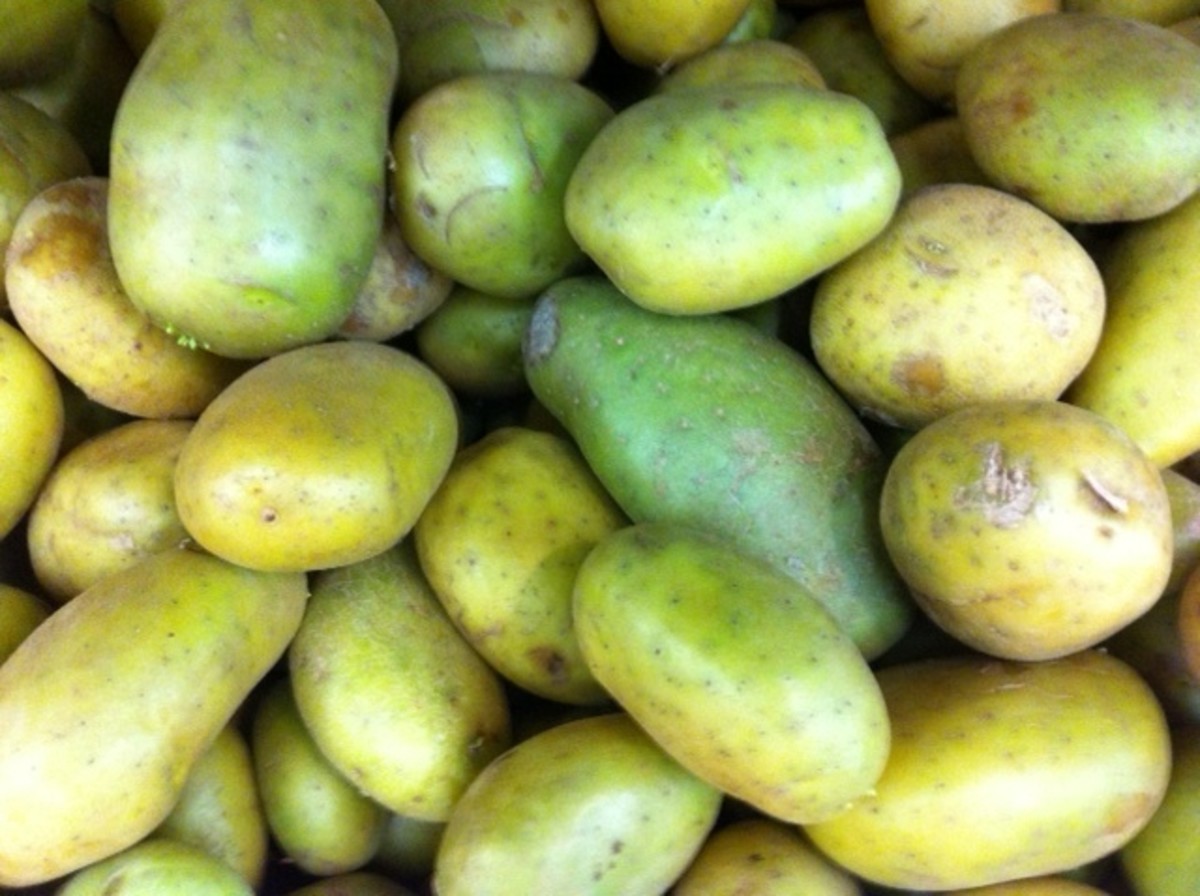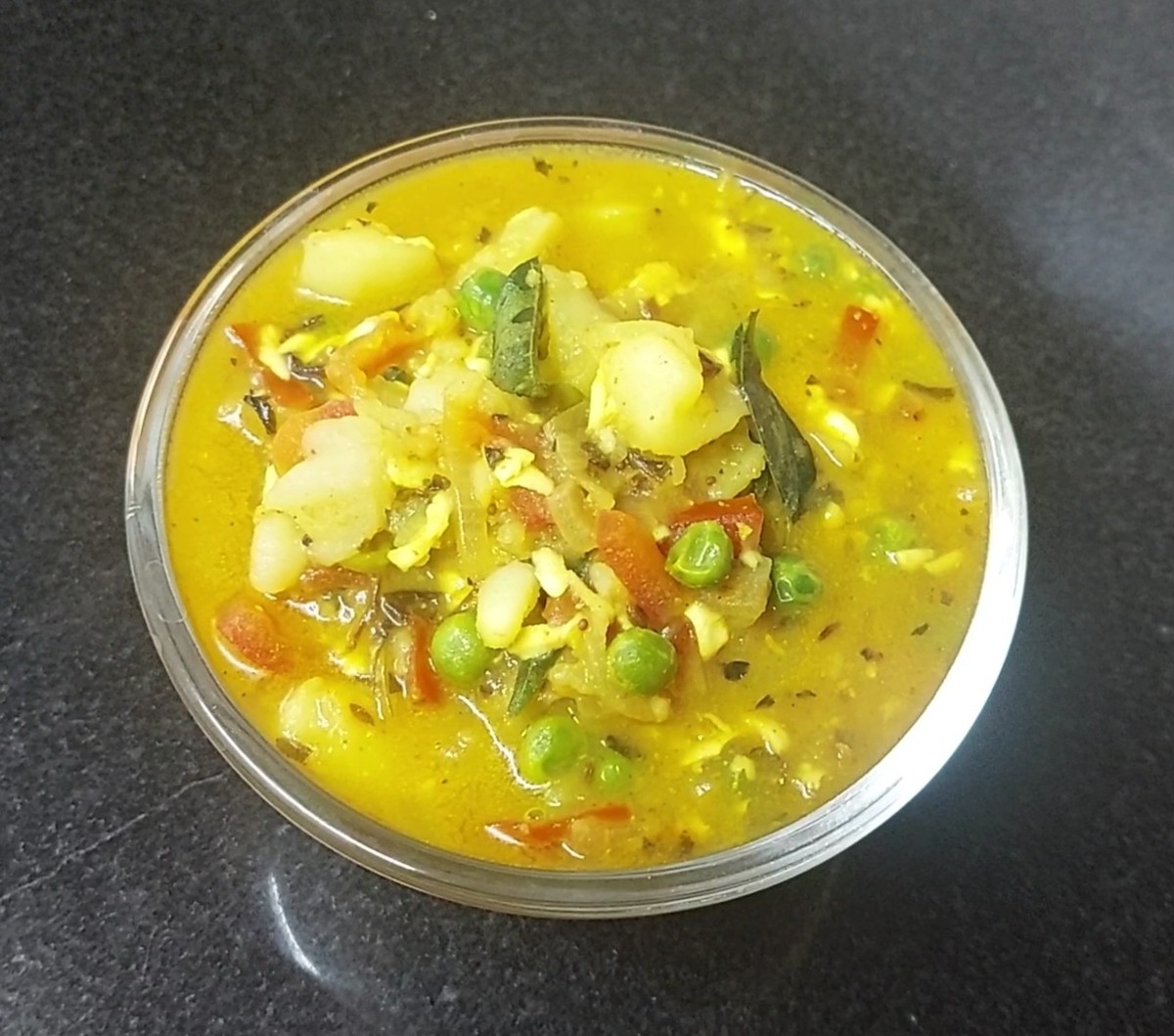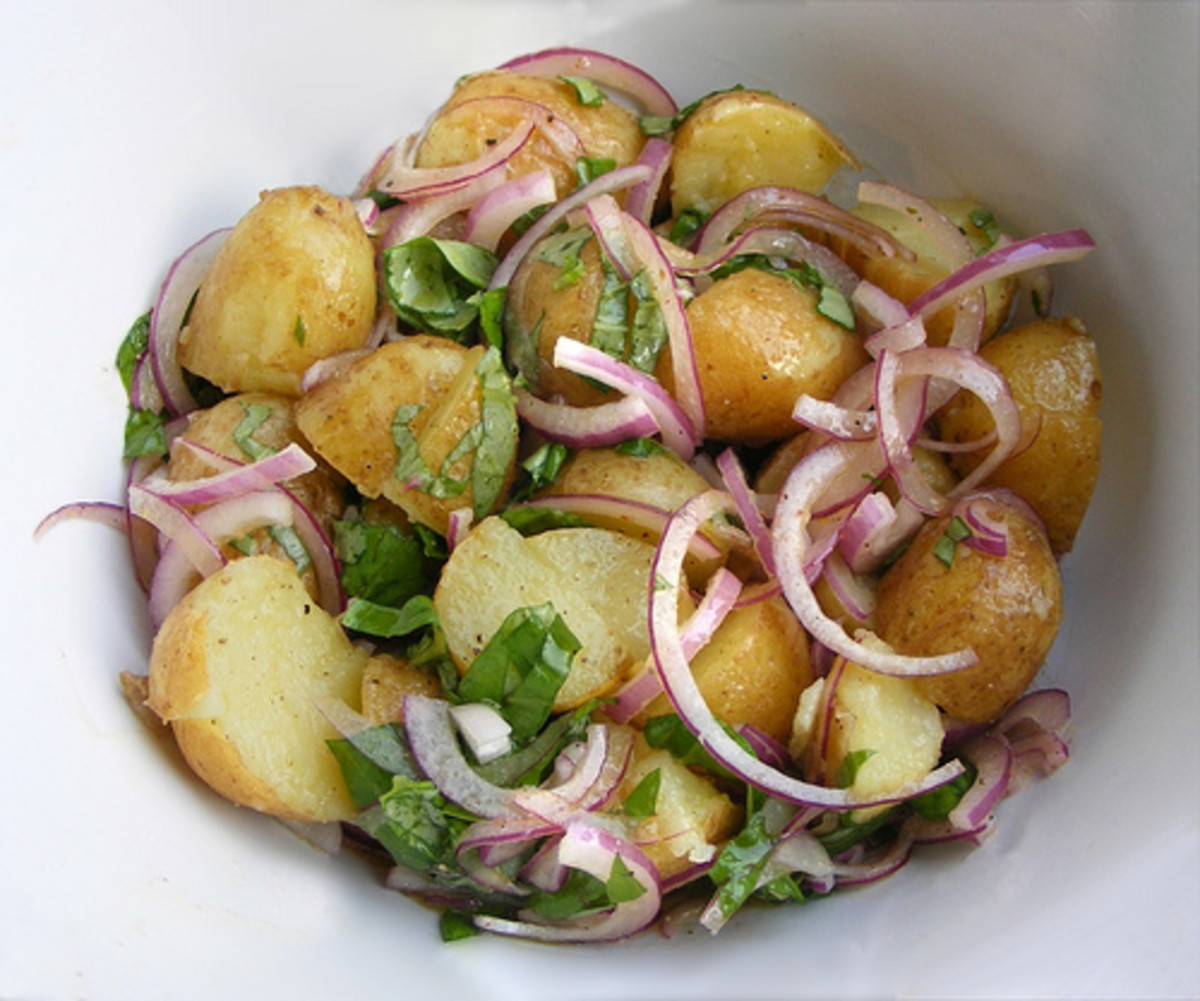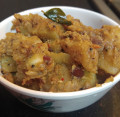Low Carb Sweet Potato Recipe
Nutritional Vallue of Sweet Potato (Source: Wikipedia)
Raw Sweet Potato Nutritional value per 100 g (3.5 oz)
Energy 90 kcal 360 kJ
Carbohydrates 20.1 g
- Starch 12.7 g
- Sugars 4.2 g
- Dietary fiber 3.0 g
Fat 0.1 g
Protein 1.6 g
Vitamin A equiv. 709 μg 79% - β-
carotene 8509 μg 79%
Thiamin (Vit. B1) 0.1 mg 8%
Riboflavin (Vit. B2) 0.1 mg 7%
Niacin (Vit. B3) 0.61 mg 4%
Pantothenic acid (B5) 0.8 mg 16%
Vitamin B6 0.2 mg 15%
Folate (Vit. B9) 11 μg 3%
Vitamin C 2.4 mg 4%
Calcium 30.0 mg 3%
Iron 0.6 mg 5%
Magnesium 25.0 mg 7%
Phosphorus 47.0 mg 7%
Potassium 337 mg 7% Zinc 0.3 mg 3%
Percentages are relative to US recommendations for adults.
I keep seeing this headline: "Low Fat Sweet Potato Recipe" and it's driving me crazy. Sweet potatoes are naturally low in fat, Why would you need a special recipe to lower the fat content of sweet potatoes?
So, even though I'm not looking for low fat recipes, I sneak a look just to see how it's done. It turns out that you add some sugar, and this somehow reduces the fat content of the final product.
Now, at first, this baffles me. Then I realize how it works: let's suppose that a sweet potato does contain a miniscule amount of fat, like about a tenth of a gram, as opposed to over 20 grams of carbs. How do we prepare a dish whose main ingredient is sweet potatoes, and reduce the percentage of fat? You add sugar, thereby increasing the percentage of carbs and automatically reducing the percentage of fat! It still contains the same amount of fat, only now the fat is even more dwarfed by the amounts of sugar that you've added in addition to the natural sugars and starch in the original sweet potato..
It's a brilliant technique! I have a feeling that the folks in the food processing industry have been using it for years.
I've been mulling this over in my mind for the past few months. Every time I see the headline, I get a little jolt. Then I tell myself, never mind. It's not important. Let's not make a big deal of it. Let's write about the history of bread or why it's not a good idea to overindulge in water. or about where food comes from.
But then one day it came to me: I bet this same technique could be used to boost the fat content of sweet potatoes. And this is how I came up with the following low carb sweet potato recipe.
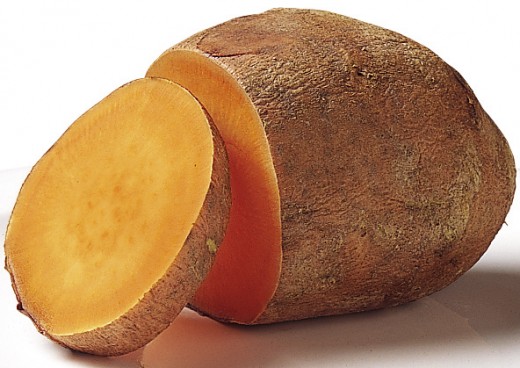
Ingredients
Package of uncooked breakfast pork chops
One onion
Non-stick cooking spray
Cooking Oil of Your Choice or Lard
Water in a shot glass or egg holder.
One sweet potato
Spray pan. Chop onions and fry in oil or lard. Slice uncooked sweet potato into thin, flat, round slices. Add sliced sweet potato to the onions. Finally add pork chops. Fry, reduce heat, add a little water to cause steam to rise. Cover pan and allow to simmer. The whole process can take about twenty minutes, depending on temperatures and quantities.
If you eat the sweet potato as part of a meal in which the majority of the calories come from fat, then the high sugar content of the sweet potato will form a smaller part of your entire caloric intake for the meal, and therefore, it will be a lower carb meal than if you eat sweet potato alone. Hence "low carb sweet potato recipe" applies to the porkchops and the onions and the sweet potatoes all consumed together.
However, if you look at it as pork chop recipe, rather than a sweet potato recipe, then I would have to say it's a relatively high carb pork chop recipe. It all depends on your point of view!
If you want it to be really low carb, remove the onions and the sweet potatoes. However, in that case, calling it a sweet potato recipe would be a tad misleading.
What if we just concentrate on the nutritional value of the sweet potatoes when they are prepared in the way I've shown above?
Fried in oil and pork grease, the sweet potatoes have absorbed a certain amount of fat. While the sugar content hasn't altered, the fat content has gone up. This means you will feel full after eating a smaller amount of sweet potato. So in fact, preparing the sweet potato in this way reduces not only the percentage of carbs in the meal, it may also induce you to eat less of the sweet potato. If that happens, then you will have reduced your absolute carb intake, not the just the relative value of carbs to fat.
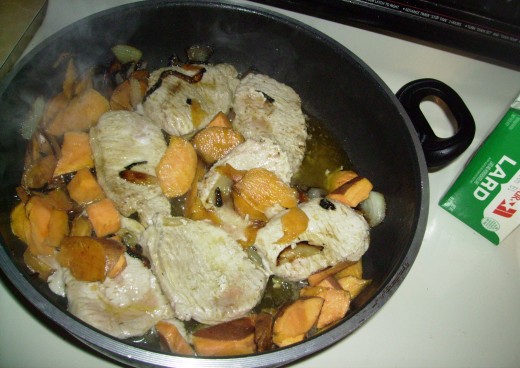
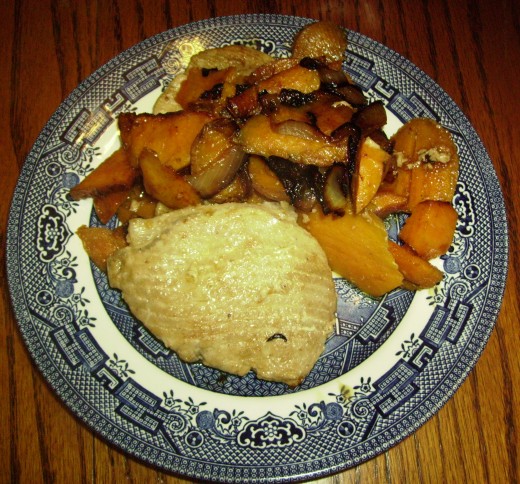
But what does it taste like?
The low carb sweet potatoes do somehow taste less sweet than a sweet potato that has simply been baked. They taste richer, in the same way that baked goods taste richer when shortened with lard.
There was a tendency in the second half of the twentieth century to replace animal fat with plant by-products in almost all phases of food preparation. Hence we had Crisco, not lard, as the shortening of choice.
My mother used to bake with butter, and this made for richer cookies that required less sugar. When I was in Taiwan, I enjoyed mooncakes, which were shortened with lard. It took me a while to realize why they were so rich!
Our bodies crave both sugars and fat. When both are scarce, there's no problem of overindulgence. When both are plentiful, we have to make a choice as to which we think is better for us.
The FDA Daily Recommendations
There is considerable disagreement about how much fat and how much sugar we need on a daily basis. The FDA daily recommendations are as follows: 65 grams of fat, 50 grams of protein and a whopping 300 grams of carbohydrates, for a person on a 2000 calorie a day diet.
Now, carbohydrates are not all simple sugars, but all carbohydrates convert much more easily into sugars, as compared to fats that require more expenditure of time and energy.
Every time we eat carbs, we experience a blood sugar spike, followed by the release of insulin. Because converting fat into sugar takes longer, we experience less of a spike and more of a steady release of energy over the day when we consume fat. For this reason, a diet high in fat and low in carbs is less likely to lead to insulin resistance, diabetes and chronic weight problems.
Nevertheless, the FDA opposes a high fat diet and recommends one that is high in carbs.
- Amazon.com: Diet & Heart Disease : It\'s NOT What You Think: Stephen Byrnes: Books
Amazon.com: Diet & Heart Disease : It's NOT What You Think: Stephen Byrnes: Books
De-bunking the lipid hypothesis
If you look up the lipid hypothesis in the wikipedia, you will find it described this way: "It was proposed by the German pathologist Rudolph Virchow in 1856 and suggested that blood lipid accumulation in arterial walls causes atherosclerosis."
That's fairly uncontroversial: fat deposits in arterial walls can constrict the flow of blood and promote heart disease. However, there's another lipid hypothesis, one that isn't as easy to look up, but that many people still accept. That second lipid hypothesis says: if you eat fat, you get fat.
When the official lipid hypothesis is paired with the unspoken, yet all prevasive, second lipid hypothesis, we get the following sorts of recommendations: a low fat diet is a good way to avoid heart disease, obesity, chronic inflammation and cancer. These dietary recommendations have greatly contributed to the obesity epidemic in the second half of the twentieth century. People are still following these recommendations today, despite all the evidence to the contrary.
It's true that being overweight is bad for your health. It is true that it leads to a higher incidence of inflammation, unnecessary fat deposits, diabetes, heart disease and cancer. What is not true is that if you are overweight, then the best thing to do is to go on a low fat diet. Low fat diets, when indulged in by overweight people, lead to even greater weight gains and an increased incidence of all the diseases previously mentioned,
This does not, however, mean that all people should be on the same diet.
Frequent Misconceptions About Food
- A calorie is a calorie is a calorie -- While a calorie is a unit of energy, in order to benefit from this energy, we must convert it to a form we can use. Our body uses simple sugars. If you consume a simple sugar, then it's available as energy with little delay or cost. If you eat fat, you will first need to convert the fat to sugar. Clearly, it costs less to convert a sugar into a sugar than converting fat into sugar. Every time we convert one form of energy into another, it costs us.
- The best policy is to eat a wide variety of foods, no matter what those foods are or in what combinations. If you just stop to think about it, you can see that that doesn't make sense. Some foods are highly toxic and others are not. Some foods contain substances that are essential (meaning that we can't produce them ourselves, but must ingest them) and others do not. Blindly seeking out variety without considering toxicity or essentials is not going to get you the best results.
- the only issue in food consumption is getting the right nutrients --This doesn't sound that wrong, but it depends on how you define nutrients. Many people define nutrients as minerals, vitamins and fiber. You can't live on minerals, vitamins and fiber. You need calories, too. Without caloric intake, we starve. It may also make a difference in what combinations nutrients are found together. As with drugs, some combinations are beneficial and some may be lethal.
- all people do well on the same diet, because we all have the same needs -- Each body is unique. You can't prescribe the right diet for another person, without knowing the person's basic metabolic rate, body mass index, food allergies, degree of insulin resistance or production, and a host of other factors that vary from one person to the next.
- the reduction of calorie consumption always leads to weight loss, and not vice versa -- To lose weight your energy intake should be less than the amount of energy that you expend. In short, you need an energy deficit. This can be achieved in a number of ways. You can exercise more and eat the same number of calories. Or, you can somehow boost your metabolism so that you burn more calories when at rest. Sometimes we lose weight first, then, because we need fewer calories to maintain our current weight, we start consuming fewer calories.
Empirical Proof and the Strict Construction of Low Carb Diets
I will probably have lost half my audience at this point: all those who are staunch supporters of the low fat movement. In this section, I will probably alienate the second half of my audience: those who are staunch supporters of the low carb diet.
I know someone who shares most of my concerns about the dangers of a low fat diet. He doesn't understand how I can eat sweet potatoes at all, when they are clearly a high carb food. The dialogue between us, over the past few years has gone something like this:
Low Carb Advocate (LCA): Sweet potatoes are very high in carbs. Why are you eating them?
Me: My holistic herbal says that eating sweet potatoes helps to regulate blood sugar.
LCA: That's nonesense. Where's your evidence?
Me: Studies have been done to show that eating sweet potatoes creates less of a blood sugar spike than eating other starchy foods, like white potatoes.
LCA: The statitstics in those studies are flawed. Have you ever tested your blood sugar immediately after eating a sweet potato?
Me: No.
LCA: Then you have no empirical evidence to support your contention.
Me: Have you tested your blood sugar after eating a sweet potato?
LCA: Yes, I have. It went through the roof.
Me: But I thought you never eat sweet potatoes.
LCA: Sometimes I do crazy things, in the interest of science.
Why do I eat sweet potatoes when the evidence in their favor is so murky? Because I don't eat for nutritional purposes only. I eat for pleasure. I eat as a part of a social ritual. And I happen to believe that we don't know everything there is to know about nutrition yet.
When we don't know everything, then there's a little bit of hedging going on. Is there a secret ingredient in sweet potatoes that helps to regulate blood sugar? Probably not. But it just might be possible that all of the ingredients of the sweet potato put together promote a stronger metabolism that is less prone to developing insulin resisitance. This would not mean that there is less of a sugar spike after eating a sweet potato. It would mean that despite the sugar spike, the person eating the sweet potato would be less likely to succumb to diabetes in the long run.
I could live on gluten free hot dogs and psillium tablets and multivitamins, and as far as the latest scientific evidence is concerned, this might be a perfectly healthy way to live. But I don't trust the latest science. Not even those things put out by low carb advocates. So I choose to eat real food.
Michael Pollan talks about nutritionism
Michael Pollan has a book out called In Defense of Food in which he derides the evils of nutritionism. I highly recommend the book and also the video clip of Pollan talking about it, which I have embedded above. I don't agree with all of his conclusions (especially his maxim to eat mostly plants), but I admire his reasoning on the subject.
Ever since we began to realize that food consists of nutrients, we have had the tendency to demonize one set of nutrients, and to glorify another. Low carb advocates demonize carbs. Low fat advocates demonize fat.
In fact, what nutrients you need depends on your specific situation. If someone is starving and at death's door, we're not going to give him a slab of blubber to chew on. He may not have enough energy to turn fat into sugar. It would be better to give him glucose which he can use immediately.
On the other hand, if someone is three hundred pounds overweight, putting him on a low fat diet is the wrong thing to do, unless you're trying to kill him. It's better to give him a high fat diet that will promote weight loss and will avoid dangerous blood sugar spikes.
Most of us are at neither end of the spectrum, and yet individual differences in metabolism make for different dietary requirements.
Hummingbirds versus Sloths: Variations in Metabolism
Sloth Me Avg. Human Bow
|-----------------------------|-----------------------|-----------|------------|--------------|
Sword Hummingbird
Variations in Natural Metabolism
Variations in metabolism manifest early in life. If you were to look at me at one year of age, you would see a chubby little creature who moves slowly, sits still for very long periods of time, and is not athletic. At one year, I had not yet begun to walk. Looking at my daughter at the same age, you would see a slim little girl who fidgets a lot and burns energy in amazing gymnastic feats. She used to leap off the furniture for not apparent reason. Now consider my son Bow. He is a chimpanzee with almost no body fat, even at one year of age. He could support his entire body weight at birth. Sitting still, at one year, would have been torture for him.
Muscle to fat ratios determine to some extent what your metabolism is going to be. While we can change our habits and change our bodies in the process, most bodies come with an in-born tendency to remain at a particular metabolic rate and a corresponding muscle to fat ratio.
This means that different diets are appropriate for different people.
What are Calories?
- Understand what Calories mean
What exactly are calories? Many people will answer this question by saying that calories are bad, or that whatever they are you have to watch them, or with a blank stare. When attempting to lose weight,...
Some studies show that people who are relatively skinny eat more fruits and vegetables than people who are fat. I think this is true. What is not true is that eating this way is what makes people skinny.
Our bodies come pre-programmed to crave what we need. My daughter, for instance, gravitates naturally to a diet high in fruits and vegetables and other carbs. She eats salad, because to her it tastes good. She stays away from many fatty foods. She won't eat the skin of her chicken.
Because my daughter is skinny, her body is telling her she can't afford to wait for fat to be processed into sugar. She needs a higher carb diet than I do.
Because I have always had a slower metabolism, I've always enjoyed the fattier bits of the meal. I do eat the skin along with the chicken meat. I did it when I was my daughter's age, too. This is not how my metabolism got to be slow -- this is what my body tells me to do, because of my slow metabolism.
In Bow's case, he eats a diet very high in fruit, with some vegetables and smattering of nuts and meat.
Bow, Sword and I eat many of the same foods, but we prefer them in different proportions, each according to our own needs.
Is Natural Always Best?
Is doing what your body tells you always the right thing? No. Not always. If you are addicted to mind altering drugs, then ending the addiction will mean ignoring your body while it screams that it wants more drugs. If you have become addicted to High Fructose Corn Syrup, then ending that addiction may also mean ignoring some of your natural impulses.
The more processed and unnatural the product, the more likely it is that your natural instincts will steer you wrong. Does this mean that food in its natural form is always best? No. Not always. Some mushrooms are poisonous. Some foods have to be cooked before they are edible. Some dietary additives have saved lives.
Nevertheless, more often than not, if you stick to traditional foods in their more nearly natural form, then listening to your instincts about which foods to eat is more likely to pay off. Our instincts evolved before the advent of processed foods.
So, which sweet potato recipe do I like best? Low carb or low fat? Neither. I'm never putting sugar on my sweet potato, whether it comes in the form of marshmallows or raisins, white sugar or brown. Yes, if you add sugar, the product naturally becomes lower in overall fat. But that is a bookkeeping trick that does nothing to improve either the taste of the sweet potato or its nutritional value. I enjoy my sweet potatoes fried every once in a while, and when they are fried, the overall carb count goes down. But this, too, is mostly a trick played with numbers. My all time favorite sweet potato is baked. No sugar added. No fat added. All sweet potato all the time.
Here's the recipe: take one sweet potato. Wash it. Wrap it in aluminum foil. Bake at 400 degrees for an hour and a half, until soft. Eat with a spoon. Consume every part, even the skin.
But I don't eat the whole sweet potato. That's too much. I eat half. Bow eats the other half. This makes us both very happy.
(c) 2009 Aya Katz
Related Pubs
- Sweet Potato Recipes | PubWages
There are many ways to prepare sweet potatoes. All are delicious. Sweet Potato pie, anyone?



